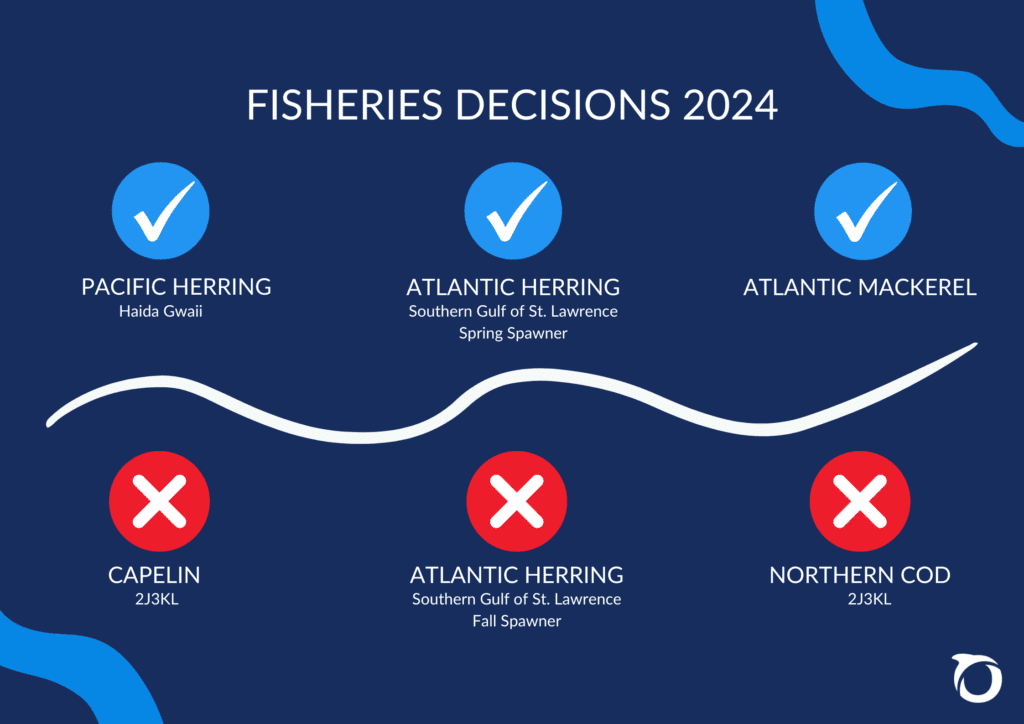August 2, 2024
The Countdown to Protect Fish Stocks in Canada
Estimated reading time: 0 minutes
BY: Rebecca Schijns
Topics: Rebuild Ocean Abundance
How fisheries are managed has a big impact on the health of the oceans, future of coastal communities and the economy in Canada. Meaning, we should all care about how fish and the industries that harvest them are managed. The good news is Canada modernized its Fisheries Act in 2019, to help ensure fish stocks are managed in ways that rebuild depleted wild populations to healthy and abundant levels. The bad news is that the law does not apply to all fish stocks yet, and progress to implement it has been slow and inconsistent. So far, only 30 fish stocks have been included under the Act’s regulations, while the Canadian government has committed to including nearly 200 federally managed key stocks in subsequent “batches”. During the 2024 fisheries season, there were big discrepancies in how fisheries were managed and a failure to follow the intent of Canada’s fisheries law. Overfishing and fisheries mismanagement are still prevalent in Canada, and for many fish stocks the law to help correct this keeps sitting on the shelf.
At the current pace of batching in fish stocks under the Fisheries Act regulations, it would take 16 years for all fish stocks to be protected by this law, requiring five batches in total. This is an unacceptably slow pace of implementation. The countdown is on for batching in all stocks. This clock shows how long it has been since the Fisheries Act has been passed, we’ll stop the clock once all fish stocks in Canada are protected by this law.
[Counter-Box id=”2″]
Why the Fisheries Act Matters
The urgency of getting all stocks batched under the Act can be seen in how fisheries decisions are made. As major 2024 quota decisions were announced by Fisheries and Oceans Canada (DFO), whether a stock was managed in a way that support rebuilding (as required under the Fisheries Act) often depended on if a stock was “batched” under the Act.
Here’s a recap of this year’s fisheries decisions highlighting a few stocks where quota decisions followed the best available science and the intent of rebuilding stocks to healthy (√), and those that did not (X).

The Good
As you can see in the fisheries with checkmarks above, some good decisions were made this year. These stocks are batched in under the Act, and quota decisions (how much to fish) were more timely, transparent and followed the intent of rebuilding depleted fish populations back to healthy levels. While many stocks still need rebuilding plans to further guide their recovery, the protection of the Fisheries Act has helped stop some overfishing and mismanagement that ran rampant across Canada for decades. Notably, rebuilding critically important forage fish, such as herring and mackerel, can help restore entire ecosystems by providing an abundant food source to whales, seabirds, and coastal communities.
The Bad
Many more fish stocks are still not batched in under the Fisheries Act and DFO continues to make decisions about these fisheries without following the intent of the law. Risking the long-term health of the ocean and the fisheries they support. The 2024 season saw this starkly, with non-batched stocks continuing to be overfished and mismanaged. For example, capelin. This important forage fish is at the tipping point between cautious and critically depleted and continues to be overfished. The removal of capelin also devastates commercially important stocks like Northern cod. While the commercial cod fishery was opened this year for the first time in decades, there is no plan in place to ensure its recovery – a clear textbook case of fisheries mismanagement.
The Questionable
Not all fishery decisions are clear X or checkmarks, some fall into a gray zone with a mix of good and bad. While redfish are not batched yet the reopening of the commercial redfish fishery came with the introduction of new management measures. At the same time, we saw the strong, science-based management plan ignored when DFO set a quota more than double the initially proposed amount, potentially jeopardizing the recovery of redfish and other groundfish stocks.
Speeding up the Fisheries Act Implementation
Coastal communities deserve rebuilt, abundant fisheries. To support this, all stocks in Canada must be batched under the Fisheries Act, triggering rebuilding plans for critically depleted stocks and management decisions that can help bring them back to healthy levels. The urgency and importance of this work must be matched by the pace of implementation. As we close out the first half of 2024, Fisheries and Oceans Canada has several months to prepare for next spring when again major decisions on key stocks will be made. We have the tools, knowledge and laws to better manage fisheries, now we need action.
Join Oceana Canada in calling for Canada to stop overfishing and rebuild wild fish populations, add your name here.

